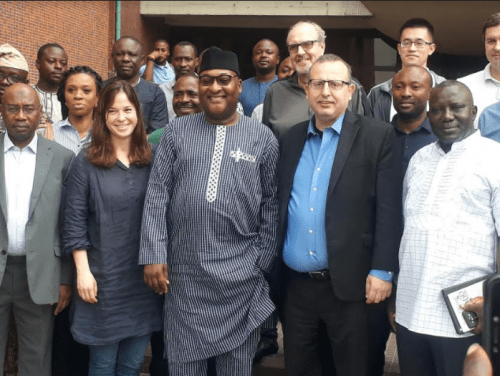
The International Monetary Fund (IMF) has identified infrastructure deficit especially poor port access roads, absence of national single window and lack of scanners as major challenges hampering operational efficiency of Nigerian seaports.
IMF’s mission chief to Nigeria, Amine Mati, stated this in Lagos on Saturday when he led a staff team on a working visit to some of the port terminals in Lagos.
Some of the terminals visted by the IMF team include APM Terminals Apapa, GDNL Terminal both at the Lagos Port Complex Apapa and PTML Terminal at the Tin Can Island Port Complex.
Mati, who had earlier visited the Nigerian Shippers’ Council (NSC) with his team, said the purpose of the visit was to assess past operational performance of the port, identify challenges and the priorities set by government in addressing the problems.
He said, “This is part of our field visit as part of article four mission – an annual surveyor’s mission that we do, looking at past performance, the challenges, and the outlook. We are still meeting with government, financial sectors, manufacturers, Lagos Chambers of Commerce (LCCI) to help look at the constraints to the economic growth in the country.”
Mati said cargo clearance time at Nigeria’s ports has improved albeit rather slowly due to the identified challenges, stating that there is need for the Nigeria Customs Service (NCS) to accelerate clearance process to reduce cargo dwell time at the port.
“We have seen that clearance time has improved but it still remain challenging as the Ports Authority and different operators have recognised. There are challenges of road logistics outside the port as the volume of trade is picking up at the ports in Lagos. The challenges have increased because the terminals have higher cargo to deal with as a result of the border closure.
“We are looking at the different priorities and policies that are being put in place particularly scanners to help improve clearance. The national single window is also needed to help accelerate this process.
“The customs clearance process also need to be accelerated and infrastructure improved on so that goods can be distributed to their destination in a short time,” he said.
Speaking earlier, Executive Secretary, NSC, Hassan Bello, said the IMF Economic Outlook Review is important to Nigeria especially now that the country is facing serious economic challenges with diversification of its source of revenue.
He said it is important that government gives the port sector adequate attention.
Bello, who noted that infrastructural challenges remain a major factor impeding Nigeria’s port efficiency, said the government was making efforts to fix the roads as well as make provision for rail linkages across the ports.
He said, “The economic outlook we are to review is very important to Nigeria especially now that the country is facing serious economic challenges. It is important that the economy of the ports be given attention.
“Nigerian ports attract 40 to 60 percent of all the cargo in the sub-region. We want to attract cargoes because of the economic consequences; we want Nigeria to be the hub. But there are constraints and these constraints are clear. There are logistics problems and one of it is the infrastructure.
“The roads to and out of the port is a challenge and the government is now working, constructing all the roads leading to the ports. The government is also going to introduce rail services into the ports.”
Bello also noted the need to prioritise port automation, stating that Customs still conduct 100 percent physical examination of cargoes due to lack of scanners.
“We are also concerned with the ease of doing business. For now, it is 100 percent examination because there are no scanners in the ports. But I think around March or second quarter of the year all these things will be done with the Customs and all the stakeholders because the ports itself is that of many interests.
“We also need to automate the ports for faster clearance of cargoes. What we are doing now is about 18 to 20 days cargo dwell time; we want to reduce it. So we are trying to build a port community system so that we will have professional synergy and then of course national single window, which is the simplification of all the processes,” Bello added.
